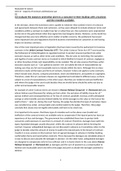Abdulalah Al-Jobore
Unit 21 - Aspects of Contract and Business Law
D2
D2 evaluate the statutory protection given to a consumer in their dealings with a business
and the remedies available.
In the old days, where the businesses were capable to whatever they wanted in term of contracts
and agreements between them and customers, as they were allowed to include whatever terms and
conditions within a contract no matter how fair or unfair they are, the customers were unprotected
by the law or the government when they signed into bad bargains (deals). However, as the world has
changed and law was more effective and a matter of public concerns, the parliament has issued
some important laws and regulations that limit business overwhelmed on customers as well having
impact on business contracts.
One of the most important piece of legislation that have been issued by the parliament for business
contracts is the Unfair Contract Terms Act 1977, The Unfair Contract Terms Act 1977 was issued by
the Parliament of United Kingdom to regulated contract to protect innocent parties from unfair
exclusion clauses as well as other terms and conditions. This Act aims to restricting the operation
and legality of some contract terms as it extend to which liability for breach of contract, negligence
or other breaches of duty and responsibility can be avoided. This act also ensures that these unfair
exclusion clauses such as ‘’ Cars parked at owners’ risk’ are satisfy the test of reasonableness by
making sure they are fair and reasonable terms to include within the term. Although this act does
extends to nearly all the types and forms of contacts, however it does not apply to some contracts,
which include land, insures, company promotions, share and debentures, and patents or copyrights.
Therefore, under this act, exclusion clauses are regulated and controlled in different ways; as there
subject to a test of reasonableness or the other way is that they are rendered void and ineffective
and where the judge in the court could decides they are invalid terms should be strike out due to
unfair and unreasonable reasons.
An example of unfair Contract terms are shown in Horace Holman Group Ltd –v- Sherwood Ltd case,
where Holman sued Sherwood for relying on their unfair the exclusion of liability clause for all ‘’
special, indirect and consequential loss or for loss of contract, goodwill, revenue, profit anticipated
savings or other benefits and also limited liability for all the damages to the value or the licence fee
paid to them.’’. Later on, during the court hearing, the judge has decides this type of exclusion clause
was considered as unfair, unreasonable and unenforceable by the judge. Therefore, they judge
conclude that clause was not legally enforceable and have to be struck out.
It is important to be aware, that these type of remedies such as the above case (invalid and
ineffective of the contract terms) are available only to compensate if the injured party has faces an
experience of loss and damages. The government has established these laws to protect both
consumers and businesses in case there is a breach of contract. Therefore, damages have split into
types; liquidated damages usually discussed within the contract in advance before forming the
contract, however unliquidated damages are not discussed in advance as it sometimes refers to the
judge to decides what the amount of money to paid to the injured party in the breach of contract.
Usually it is very common to find contract form of agreed damages in advance in holiday booking
confirmation forms and construction contracts. This is because the damages are calculable where it
is easy to discuss and calculate the damages in advance. On the other hand, unliquidated damages
are designed to compensate only for loss suffered, and it is clearly shown in the case above Horace
Holman Group Ltd –v- Sherwood Ltd, as damages and the sum of payment as a compensation to
Holman was incalculable and it was left to the judge and juries to decide the damages awarded to
Holman.
1






